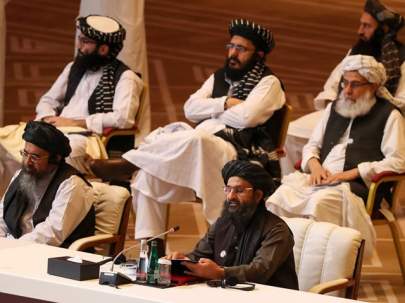Taliban: Biden Afghanistan Extension Allows ‘Every Counteraction’ Against U.S. Troops

A spokesman for the Taliban marked May 1, the deadline for the American military’s withdrawal from Afghanistan to which former President Donald Trump agreed, by threatening attacks on U.S. troops in response to Biden not respecting the deadline.
President Joe Biden announced in April that he would not adhere to the May 1 deadline and instead withdraw all American military personnel from the country by September 11, 2021 — the 20th anniversary of the al-Qaeda jihadist attacks that prompted America’s military action in Afghanistan a month later. In extending the war, Biden declared that the conflict had gone on too long and he was proud to conclude it. Biden’s secretary of state, Antony Blinken, has since emphasized that America would continue heavily investing in Afghanistan in a civilian capacity long after troops leave.
The agreement that Trump’s administration signed last year required the Taliban to stop cooperating with international terrorist groups like al-Qaeda and to stop attacking American troops. In exchange, the U.S. military would withdraw by May 1. Since the United States did not keep its end of the agreement, Taliban spokesman Zabiullah Mujahid said this weekend, the Taliban would no longer avoid attacks on Americans, as it largely has for the past six months.
Biden’s “violation in principle has opened the way for [the Taliban] to take every counteraction it deems appropriate against the occupying forces [the United States],” Mujahid wrote on Twitter. The Afghan news agency Khaama Press (KP) confirmed that the Twitter account in question is legitimate and used by an official Taliban spokesman.
“He added then [sic] Taliban will take actions to launch attacks on the US and NATO forces,” Khaama elaborated. “Mujahid clarified that the May 1st deadline has passed and that this has allowed the Taliban to take every attack option possible against the foreign forces.”
Taliban officials made similar statements following Biden’s initial announcement of a delay in ending America’s longest war. Initially, the terrorist organization attempted to attract sympathy from the United Nations and other international actors by asserting that its leaders had acted in good faith in signing the agreement with the Trump administration last year in Doha, Qatar, where the Taliban maintains a political office.
“This decision is a clear violation of the Doha Agreement and non-compliance with its commitments,” the Taliban said in an official statement in mid-April. “As this agreement was signed in the presence of United Nations and representatives of numerous world countries and organizations, and is currently being breached by America, it is imperative that all countries and organizations that were witnesses to the signing of this agreement exert pressure on America to implement its commitments and withdraw all forces from Afghanistan by the specified date.”
The United States and NATO, rather than concluding withdrawal on May 1, began plans to leave this weekend. The Taliban, meanwhile, appears to have significantly escalated the number of attacks orchestrated nationwide, particularly against Afghan military and security forces. The Taliban considers itself the only legitimate government of Afghanistan while dismissing the true government in Kabul as usurpers. It refers to itself as the “Islamic Emirate of Afghanistan.”
Afghanistan’s Tolo News reported Sunday that the Taliban had committed 141 attacks in six provinces in the prior 24 hours, citing Afghan security sources.
“Information obtained by TOLOnews shows that in attacks by the Taliban in the last 24 hours at least 20 people were killed, including Peramqul Ziaee, a commander of public uprising forces in Takhar,” Tolo noted, “But the Defense Ministry said that the Taliban’s casualties were more than 100 in the last 24 hours. The Taliban rejected this figure.”
Tolo further noted a marked increase in Taliban attacks in the past month, documenting 438 people, military and civilian, killed in Taliban attacks and another 500 injured in the past month. Local sources in some provinces say attacks and military clashes are now a daily occurrence.
In a particularly sophisticated attack documented by Khaama Press, Taliban jihadists dug a tunnel around the entry to an army base in Bala Buluk, Farah, and used it to enter unseen and attack Afghan soldiers, killing 22 of them on Sunday night. Khaama noted Kabul’s Defense Ministry did not confirm the attack but the Taliban had taken credit for it as of Monday.
American officials have expressed concern that the Afghan military is not sufficiently trained and equipped to prevent a Taliban takeover of the country without U.S. help.
“I am concerned about the ability of the Afghan military to hold on after we leave, the ability of the Afghan Air Force to fly, in particular, after we remove the support for those aircraft,” Gen. Kenneth McKenzie, the head of the Pentagon’s Central Command, warned in remarks to the Senate on April 22.
Gen. Mark Milley, chairman of the US Joint Chiefs of Staff, appeared to refute that assessment in remarks on Sunday, calling Afghanistan’s forces “reasonably well equipped.”
“Your question: The Afghan army, do they stay together and remain a cohesive fighting force or do they fall apart? I think there’s a range of scenarios here, a range of outcomes, a range of possibilities,” Milley said in response to an interview question, casting some doubt on his original assessment. “On the one hand, you get some really dramatic, bad possible outcomes. On the other hand, you get a military that stays together and a government that stays together.”
“Which one of these options obtains and becomes reality at the end of the day? We frankly don’t know yet. We have to wait and see how things develop over the summer,” he concluded.
Photo: KARIM JAAFAR/AFP via Getty Images
Link: https://www.breitbart.com/asia/2021/05/03/taliban-biden-afghanistan-extension-allows-every-counteraction-against-us-troops/




